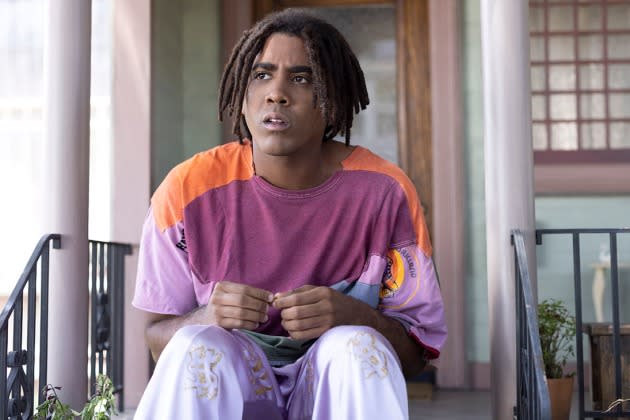Boots Riley on ‘I’m a Virgo’ Series: “I’m Not Really Making Stuff to Just Enlighten People”

Boots Riley is sharing his approach to his genre-defying mystical limited series — an anti-capitalist satire — that drops on Prime Video Friday, I’m a Virgo. The Sorry to Bother You director, writer and musician, and vocal supporter of the ongoing writers strike, aims to spur action with his tale of a 13-foot protagonist, played by Jharrel Jerome, who is let out into the world at age 19.
In Riley’s creation of 13-foot-tall Cootie (Jerome), a giant growing up in Oakland who meets a group of teen activists, the director says his creativity uses the absurd to point out the obvious in real-life situations.
More from The Hollywood Reporter
“I’m attracted to large contradictions,” Riley told Wired magazine in a recent interview. “I think about what I would think of as a good lyric. There’s this setup, which hopefully is good and says something in and of itself. But then there’s this other line that comes in that maybe feels ironic, right? Like a contradiction you weren’t expecting. It surprises. It points out something. … The contradictions of capitalism — how it works — are going to echo through almost everything we do.”
Riley dug deeper to explain his concept of using absurdities as a lens for how he sees realities within the I’m a Virgo series. “I don’t know where the thought first came up, but when you see a 13-foot-tall Black man named Cootie walking down the street, the last thing you’re thinking about is how he feels about himself,” Riley continued of the concept. “It’s all about what you want to believe and project. It leads to so many things, but specifically toward race. In this case, the title, which came later, I’m a Virgo, speaks to that — nobody cares. His astrological sign is the last thing on someone’s mind.”
The endgame to the series, he suggests, is for viewers to find clarity by staring at life through a different lens. For the director, I’m a Virgo cajoles the audience to start thinking out-of-the-box. “When you’re watching TV, you’re told you’re nothing. People that you know are nothing. What’s important are these stories, these people who are on TV. And so it could lead you to obsessing over them and feeling like that’s your connection to something bigger than you,” he says. “When I did get involved in radical politics, it was because it’s like, Oh, I can be part of making history. People want something more important for themselves. They want connection, which is very much what Cootie and Flora [Cootie’s love interest played by Olivia Washington)] are about.”
These ideas reflect Riley’s own upbringing and activism (his father protested the Vietnam War and the director has spent much of his life in community organizing).
“I’m not really making stuff to just enlighten people,” Riley explained about how his art imitates his life. “I think most of us feel like we know what is wrong. But most of the time the question is, can it be changed? Is there anything you can do about it? But really, my art can only go so far even with that approach. If there are no organizations out there for them to actually get involved with campaigns, for them to get involved with art or connect with people on the job to organize, then it kind of just sits there.”
Riley also weighed in on mass labor strikes across industries, including Hollywood’s ongoing writers strike. “What the AMPTP [Alliance of Motion Picture and Television Producers] is trying to put forward is a message that you’re not going to be able to have a say in how we do things. And I think they underestimated how willing we are to fight, because what I’m hearing from people that know folks at the studios is they thought, Oh, the writers will be fatigued by now,” he said.
Of releasing the series on Amazon he added, “I’m trying to get out there in front of as many eyes as possible. So that means I’m going to be dealing with some people that do things I definitely disagree with. … What we have to do is organize a labor movement, a mass militant, radical labor movement starting at these places. So yeah, I need to get to as many people as possible. And that means one of these big companies.”
In his review, THR‘s chief TV critic Daniel Fienberg called I’m a Virgo “a seven-episode red-hot poker in the eye of the corporate establishment,” explaining how Riley’s series “wraps its anti-capitalist message in a very thin casing that’s part superhero drama and part allegorical satire.”
Best of The Hollywood Reporter

 Yahoo News
Yahoo News 